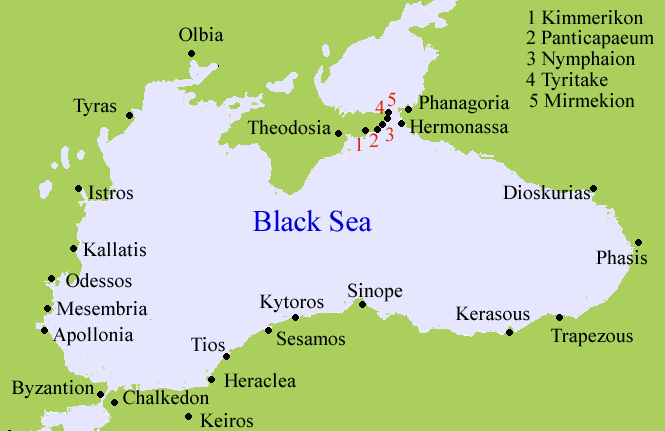.

Theodosia (Russian: Феодосия; Ukrainian: Феодосія; Greek: Θεοδωσία; Crimean Tatar/Turkish: Kefe) is a port and resort city in southern Ukraine, located on the Black Sea coast of Crimea at coordinates 45.0333 N, 35.3833 E. Its name is also transliterated as Feodosiya, Feodosiia (Ukraine's official romanized spelling - see Romanization of Ukrainian), Feodosija or Feodosia.
History
The city was founded under the name of Theodosia by Greek colonists from Miletos in the 6th century BC. Noted for its rich agricultural lands, on which its trade depended, it was destroyed by the Huns in the 4th century AD.
Theodosia remained a minor village for much of the next nine hundred years. It was at various times part of the sphere of influence of the Khazars (excavations have revealed Khazar artifacts dating back to the ninth century) and of the Byzantine Empire. Like the rest of the Crimea, it fell under the domination of the Kipchaks and was conquered by the Mongols in the 1230s.
In the late 13th century, traders from Genoa arrived and purchased the town from the ruling Golden Horde. They established a flourishing trading settlement called Caffa or Kaffa, which virtually monopolised trade in the Black Sea area and served as the chief port and administrative centre for the Genoese settlements around the Sea. It came to house one of Europe's biggest slave markets.
It is believed that the devastating pandemic the Black Death entered Europe for the first time via Feodosiya in 1347. It is believed that the bubonic plague first entered Europe with the movements of the Golden Horde. After a protracted siege during which the Mongol army was reportedly withering from the disease, they catapulted the infected corpses over the city walls, infecting the inhabitants. The Genoese traders fled transfering the plague via their ships into the south of Europe, from whence it rapidly spread.
When the Genoese started intervening in the internal affairs of the Crimean Khanate, the Ottoman commander Gedik Ahmet Pasha seized the city in 1475. Renamed Kefe, it became one of the most important Turkish ports on the Black Sea. It remained under Turkish/Tatar control until the expanding Russian Empire conquered the Crimea in 1783. It was renamed Feodosiya in 1802, a Russian adaptation of the ancient Greek name.
Feodosiya is known as the city where the Russian writer Alexander Grin spent the last years of his life and died in 1932.
The city was captured twice by the forces of Nazi Germany during World War II, sustaining significant damage in the process. In 1954, it was transferred to the control of the Ukrainian SSR.
The city today
Modern Feodosiya is a popular resort city with a population of about 85,000 people. It has beaches, mineral springs, and mud baths, and is renowned for its many sanatoria and rest homes. Apart from tourism, its economy rests on agriculture and fisheries, with local industries including fishing, brewing and canning. As is the case in much of the rest of the Crimea, most of its population is ethnically Russian and the Ukrainian language is relatively little used there.
| Ancient Greece
Science, Technology , Medicine , Warfare, , Biographies , Life , Cities/Places/Maps , Arts , Literature , Philosophy ,Olympics, Mythology , History , Images Medieval Greece / Byzantine Empire Science, Technology, Arts, , Warfare , Literature, Biographies, Icons, History Modern Greece Cities, Islands, Regions, Fauna/Flora ,Biographies , History , Warfare, Science/Technology, Literature, Music , Arts , Film/Actors , Sport , Fashion --- |
Retrieved from "http://en.wikipedia.org/"
All text is available under the terms of the GNU Free Documentation License


